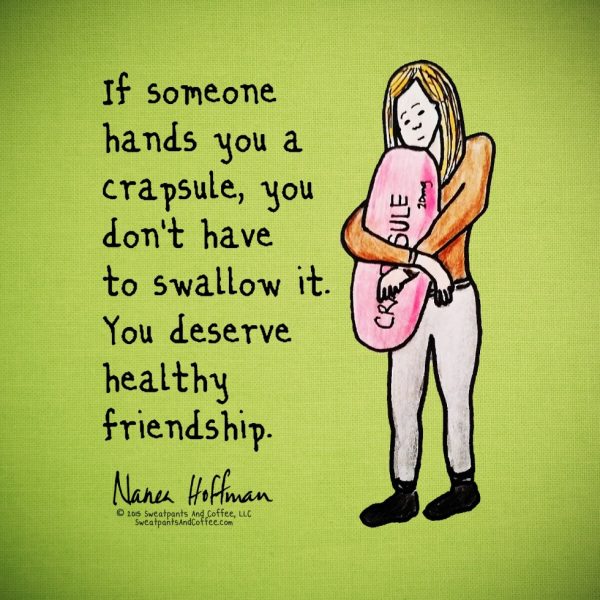
Have you ever swallowed a crapsule? If you are an adult woman who doesn’t live in a cave and has had any sort of social interaction in your life, you probably have.
Most of us are familiar with the workings of pharmaceutical capsules – smooth coated, digestible coverings that allow us to ingest the medicine contained within, which is gradually released into our bodies after we slug one of those bad boys down. A crapsule works on the same principle, except it’s metaphorical, and it contains, well…you know.
Here are some examples of crapsules:
“Wow, you sure are brave to wear that color eyeshadow. And so much of it.”
“It’s amazing the way you’re able to take time for yourself like that. Must be nice.”
“It was such a surprise to hear you got that promotion! Wow. Congratulations.”
Alternatively, any statements beginning with these phrases:
“No offense but…”
“You know I love you, but…”
“I’m just saying…”

Pretty much every woman alive has experienced the oblique, sideways, often unexpected attack that comes from a friend and slides in between your ribs, as swift and deadly as a sharpened knitting needle. Female friendships are complex, intense, and on occasion, laced with crapsules.
It turns out that there is an actual biological underpinning for this behavior. Studies have shown that women are more likely to form close, same sex friendships. We are hard-wired for caregiving, and in response to stress, women often fall into a “tend and befriend” behavioral pattern.1
Basically, over time, human females developed caregiving and bonding behaviors in response to dangerous situations. This was good for the species because if you were a cave lady whose response to danger was to grab a club and go duke it out, you could possibly get killed, your baby would be motherless, and then who would raise Fred Flintstone Jr.? It was much more adventitious for us to instinctively want to soothe our young and seek support from other females.
The thing about that is, the tendency toward direct, physical aggression in females, which is governed by those same bio-behavioral systems, became inhibited.2 This meant that female aggression expressed itself in indirect ways. This is why when your mom is pissed at you, she just rolls her eyes, looks death at you, and says she is JUST FINE. And then you know you have failed as a daughter and human being. (Another variant of this would be the long-suffering smile, followed by: “That’s all right, dear. I know you have more important things to do.”)
So, here’s what we know:
- Women need and crave close social interaction with each other.
- When there is some kind of conflict or dissatisfaction in those relationships, aggression is more likely to be expressed as a vague Facebook status than in a fist fight.
The good news, if you were paying attention earlier, is that female friendships actually serve as a stress release for women.
These bonds provide us with support and security, and they can be deeply fulfilling. We instinctively reach toward each other when we are afraid or in pain or otherwise distressed. If a friendship becomes toxic – say, for example, if the ratio of crapsules to nurturing far exceeds your tolerance, you may want to reach toward healthier women and let your “tend and befriend” behaviors find more worthy recipients.
This essay was originally published on notsalmon.com for Karen Salmansohn, here.
1 Taylor, Klein, Lewis, Grunewald, Gurung, and Updegraff (2000), “Biobehavioral Responses to Stress In Females: Tend-and-Befriend, not Fight-or-Flight,” Psychological Review, Vol. 107, No. 3, 413-429
2 Archer and Coyne (2005), “An Integrated Review of Indirect, Relational, and Social Aggression,” Personality and Social Psychology Review, Vol. 9, No. 3, 212-230





Leave a Reply